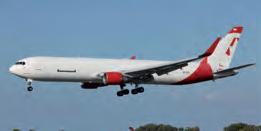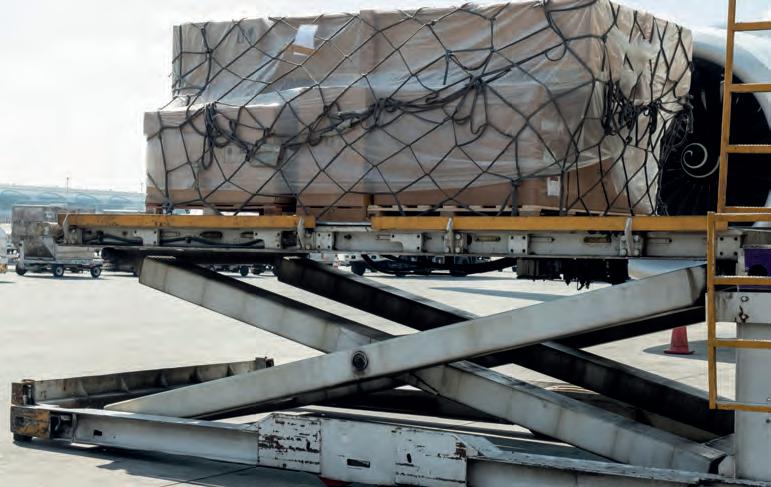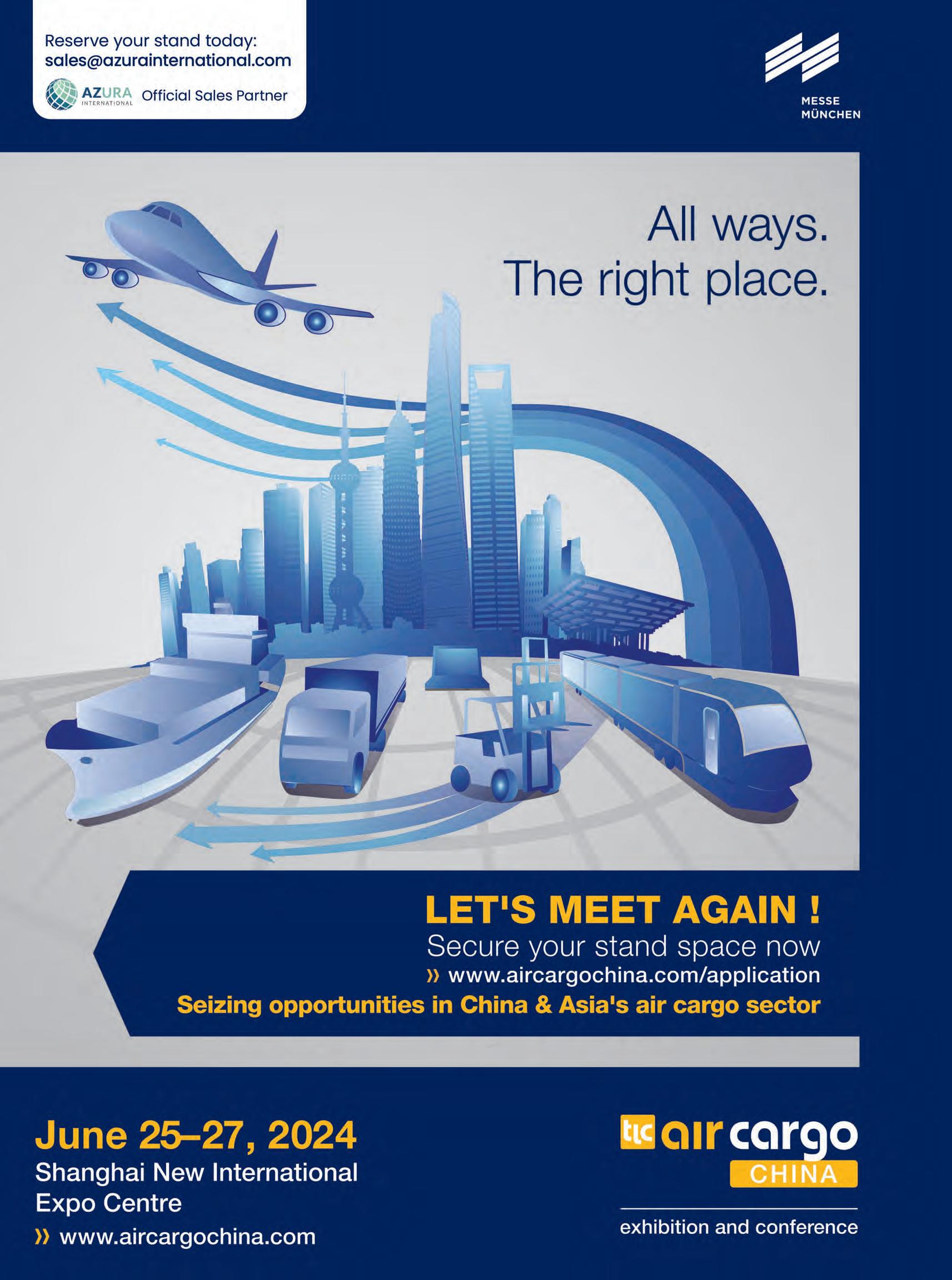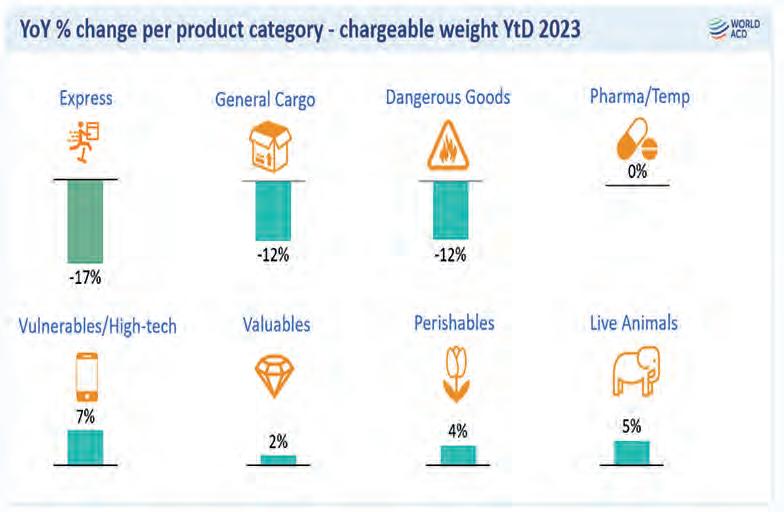
























The weekly newspaper for air cargo professionals


No. 1,251 09 October 2023




























No. 1,251 09 October 2023
Air Charter Service has restructured its operations across the Asia-Pacific region, allowing the company

to better focus on each unique market in the area. The first phase is the creation of a Greater China region consisting of its Hong Kong, Beijing and Shanghai offices. At
the helm will be the experienced team of James Royds-Jones and Wanny Wu.
Chris Leach, ACS Chairman, commented: “As a region, China
is hugely diverse, with many differences from western markets and the rest of APAC economically, culturally and politically. As a result, we have decided to build a joint regional management team with the combined skillsets to help grow our business in China over the next decade.

“James Royds-Jones will be the Regional Director for the new Greater China region, comprising of our Hong Kong, Beijing and Shanghai offices. James has been with us for 15 years, starting off in the London private jets team before moving to Hong Kong in 2013. James’s knowledge of ACS, the local market and what it takes to develop a team of brokers will be instrumental in the development of the region.
“James will be joined by Wanny Wu who has been appointed as Deputy Regional Director and will be based in the Shanghai office. Wanny has helped us navigate the administrative challenges of doing business in China since opening our Beijing office 10 years ago and has been pivotal in growing our business in China. She has done so whilst navigating through huge challenges faced by the region including the rolling lockdowns of the last three and a half years and the strict travel restrictions that were in place for much of that time.
“This is a very exciting time for James and Wanny, and together they are responsible for developing our team of nearly 50 people, targeting the second largest economy in the world. We are sure that they have the skills and knowledge to take ACS in China to the next level.”
IN 2017 alone, there were 59 fatal injuries in the freight industry in America, according to the U.S. Bureau of Labor Statistics ...
PROVIDING PAN-EUROPEAN ...
AS the global business landscape continues to evolve, the demand for seamless, time-critical logistics solutions has


EFFECTIVE TIPS FOR ENSURING ... PAGE 4
SPECIAL AIR CARGO VERTICALS ... WHILE general cargo tonnages have fallen in all of the main world origin regions, WorldACD highlights a number of areas recording tonnage increases ...


PAGE 5
ENHANCING CARGO CAPACITY ...
THE introduction of the B767300BDSF aircraft to Challenge Group’s fleet signifies a substantial enhancement in their cargo capacity
PAGE 8
Page 6-7
IN 2017 alone, there were 59 fatal injuries in the freight industry in America, according to the U.S. Bureau of Labor Statistics (BLS).
Pilots face considerable risks in their jobs, which resulted in a fatal injury rate of 48.6 cases per 100,000 full-time equivalent workers in 2017. The fatal injury rate among all occupations nationally in 2017 was 3.5.
According to the above report, working in the freight industry is more challenging than it may seem. However, like any other workplace, you must ensure workers are safe while on duty. Below are some of the measures you can take as a freight company to ensure the safety of your staff.
The #1 rule of freight industry safety practices is implementing comprehensive training programmes to allow workers to understand potential risks in their workplace. This equips them with practical knowledge of handling toxic substances and potentially risky equipment to ensure safety.
Despite being a legal requirement that must be fulfilled, training helps any company manage hazards by reducing employee injuries, illnesses, and even workplace deaths. In the long run, the company can quickly reduce the costs of injuries since employees who become victims of workplace accidents must be compensated, and according to the national council, the payment should be above $40,000.
Also, when you invest in training your employees and successfully minimising accidents, you’re safeguarding your brand and its reputation.
The training should cover all the business aspects that can
risk the employee’s health. Although the training should be enforced during the start of each worker’s employment, refresher programmes should be offered occasionally to ensure all the employees are up to date.
Personal protective equipment (PPE) is crucial for workplace safety. In America, the PPE idea has moved from being a personal choice into a legal requirement, with such bodies as the Occupational Safety and Health Administration (OSHA) and the American National Standards Institute (ANSI) enforcing their use in given workplaces.
Since implementing PPEs in various industries, the BLS has reported declining workplace injuries. For instance, it decreased by 1.8% in 2021 from the previous year, showing how important PPE is across different working environments. Therefore, given the nature of the work employees tackle in the freight industry, from handling toxic substances to dangerous equipment, the use of PPE cannot be emphasised enough.
And when talking about PPE, companies should invest in the best quality to ensure their efficiency.
In the airfreight industry, some materials transported are hazardous and need proper handling to avoid unnecessary accidents. Therefore, companies must ensure that ethical rules and regulations for handling toxic materials are followed and that such practices are circulated to all employees whenever they are updated.
All company must ensure all its employees know how to store and transport hazardous goods effectively and work in line with global and national airfreight industry regulations.
remain effective and responsive to the frequently changing health and safety issues and risks in different industries.
Although there is no legal guidance on how many policy reviews should be done in a year and at what intervals, many reasons should prompt an airfreight company to keep reviewing its policies:
• When there are significant changes that have occurred in the organisation
Whenever there are changes in the key personnel
• Any time there are changes in guidance
• If the monitoring of accidents or risks in the workplace suggests that the health and safety regulations are not responsive or effective.
• When sufficient time has passed since the previous reviews and the company finds a need to review them, among many others.
Ensuring any company’s safety policies are reviewed will achieve accident and illness prevention and improve consultation and communication throughout the organisation. It also supports personnel development and makes supervision easier, especially for young employees and those in professional training.
Acknowledging the contribution of the staff during health and safety meetings, formal recognition programmes, or internal communication channels motivates them and fosters a positive reporting culture.
Editor: Edward Hardy
Supplement Editor: James Graham
Associate Editor: Chris Lewis
Contributors: David Craik, Stuart Flitton, Neil Madden, Donald Urquhart
Director of Operations: Kim Smith
International Sales Director: Rosa Bellanca International Sales Executive: Zainab Khalid Finance Manager: Rachel Burns Design & Production Manager: Alex Brown Production Supervisor: Kevin Dennis Website
In most cases, dangerous materials shipped by air need expert employees with hazmat certification. This means they’re fully trained on the identification and classification of hazmat or dangerous goods, correct packaging and labelling, proper handling, and completing paperwork called a dangerous goods declaration (DGD).
Ensuring the airfreight company workers dealing with hazardous goods are experts should be emphasised more. This point can be seen when an employee gives incorrect details about items by misclassifying, mislabelling, or mispackaging them. The result can be fatal, a case you never want to witness. Therefore, as an airfreight company, invest in employee training to curb workplace hazards, which will help you eliminate accident costs and save lives.
Safety policies are necessary for any company, especially those handling dangerous materials. For the safety of the staff, the guidelines should be reviewed and updated regularly to ensure all the safety aspects are covered and that the workers are well updated.

All company are legally expected to review and update its safety policies regularly, whenever necessary, to ensure they
As a company, you need an open communication and reporting culture where employees feel confident and encouraged to report on hazard-related matters. This is a possible way of curbing potential risks and accidents before they occur.
Assuring your employees of confidentiality and nonretaliation is also a perfect way of encouraging a positive reporting culture. In other words, you should create a secure environment where employees can report hazardous concerns without judgement and remain protected.
Providing timely feedback and any necessary follow-ups on the reported cases assures employees that their reports matter and are not taken for granted. This motivates them to keep reporting, which in turn helps mitigate potential severe risks before they occur.
There are many ways to foster a reporting culture. In doing so, the company will witness continuous improvement and a good reputation, which are equally crucial for any business to thrive.
Workplace safety is a significant concern for any company. Airfreight industry employees face many risks that require high safety standards to mitigate. If you are a manager in the air freight industry, the above tips, along with others, will help you curb accidents, illnesses, and deaths.

Carousel’s customer-centric approach is embedded in its solution design strategy. Deniz emphasised their dedication to understanding each client’s unique requirements, stating, “We take a tailored approach to each customer and really invest the time and resources into getting under the skin of their business to identify their needs.”
“We give the customer some options on what our service could look like for them, and we then help them decide what works best to meet their needs. We also dedicate time to planning for different scenarios that could pop up, so we’re all on the same page and prepared.”
AS the global business landscape continues to evolve, the demand for seamless, time-critical logistics solutions has become paramount.
Carousel Logistics, a pan-European Critical Service Logistics specialist, has risen to the occasion, carving a niche for itself by delivering precision, efficiency, and reliability to its diverse clients.
Carousel’s core speciality lies in By:Night and By:Day time critical deliveries, catering to high-performance clients in crucial sectors such as agriculture, automotive, medical technology, materials handling, and construction.

Carousel’s Business Development Director Tim Deniz affirmed, “We drive efficiency through combining geographically targeted customer air and road operations with customer’s European and regional distribution centres.”
“This means we can consolidate any number of separate deliveries, saving on fuel and time – savings that we can pass on to the customer.”
In the aftermarket and spare parts logistics segment, Carousel is proud of its 99.8% delivery accuracy rate.
Deniz explained “Earning and keeping the trust of our customers is essential for our business to thrive, and the proof is in the pudding.”
“Because we operate our own air and truck routes, we have the agility to respond quickly and efficiently to challenges and disruptions. Our extensive network combined with our sector-specialist expertise means we can adapt to ensure business continuity.”
Carousel’s journey began in 1986 when the Martin family identified a gap in customer flexibility within the UK Critical Service Logistics sector.
Over the years, the company has evolved into a Europe-wide specialist, partnering with Axcel and merging with DANX in 2022.
This merger birthed the DANX Carousel Group, expanding critical logistics solutions across Europe, the Nordics, and the Baltic region.
Revolutionising logistics visibility Central to Carousel’s commitment to transparency and accountability is Gateway®, their proprietary data-driven digital platform.
Deniz explained, “Gateway® provides our clients with a control tower with all of the information they need. It connects all of the stakeholders involved in our services, and it facilitates the free flow of real-time information.”
“Customers can use Gateway® to livetrack shipments and change delivery details in the moment, and it also helps us identify client needs.”

Carousel’s expansion has been bolstered by strategic partnerships and acquisitions. Deniz highlights their collaboration with DANX as a game-changer, reinforcing their position as a pan-European operator.

“The merger means that customers get access to more solutions, routes, and services, all with the ease of dealing with one organisation,” Deniz stated.
“Our recent acquisition of the Dublinbased Alltrans has boosted our network in Ireland as we expand across Europe, while our partnership with TBS has introduced temperature-controlled services in hardto-reach areas of northern Norway,” he added.
In an increasingly interconnected world, efficient cargo delivery is the linchpin of global trade. The airfreight forwarding business is no place for the faint-hearted. As an airfreight forwarder, you understand the stakes. Every cargo delivery must be swift, secure, and smooth. That’s where Cargonet, your dedicated neutral airfreight wholesaler, comes in.
For over a decade, Cargonet has served as a crucial link in the logistics chain, connecting airfreight forwarders with the resources they need to succeed. Our role? To ensure you, our valued customers, can meet and exceed the demands of your clients with unmatched efficiency.
This belief drives us to offer customised services that meet your specific needs and assist you in navigating any challenges you may face. A UK-based customer’s testimonial encapsulates this commitment perfectly, “Cargonet is our unwavering ally in airfreight. Their exceptional rates, wide-ranging capacity, and personalised customer service are unparalleled.”
As we help you serve your clients better, we don’t forget our responsibilities. In an industry where compliance and security are paramount, we take every measure to ensure that cargo entrusted to us is handled with the utmost care and strictly adheres to all regulations.

Furthermore, as a company deeply committed to the environment, we make it a priority to minimise our carbon footprint through sustainable practices. By choosing Cargonet, you’re not only choosing a service that benefits your business, but also one that contributes to a greener planet.
In essence, choosing Cargonet as your airfreight wholesaler means choosing to enhance your business’s efficiency, flexibility, and profitability. It means being able to promise your clients a service that is superior in its reliability and reach. It means gaining a competitive edge in the marketplace.


We invite you to experience the difference that Cargonet can make to your airfreight business. Explore the services we offer by visiting our website at www.cargo-net.co.uk, or reach out to us directly at sales@cargo-net.co.uk to discuss a custom solution tailored to your needs.

With Cargonet your cargo is our commitment, your success, and our shared goal.
So, what makes an airfreight wholesaler like Cargonet the ideal choice for forwarders? It all starts with our offering of competitive rates and vast capacity options. These benefits directly translate into cost savings and flexibility for your business, helping you to deliver outstanding service to your clients while protecting your bottom line.
But that’s just the tip of the iceberg. Our global reach allows you to extend your services to every corner of the world. With our extensive network and strong partnerships with carriers, you’re able to guarantee your clients a truly global service.
At Cargonet, we pride ourselves on our customer-centric approach. We believe that every customer is unique and deserves personalised solutions and services.

+3% growth. Chargeable weight flown from Middle East & South Asia also recorded growth (+4%) in July and August, having dropped -7% in the first quarter (Q1) and fallen slightly (-1%) in Q2.
Volumes from Africa, and from Central and South America have been more or less flat, compared with last year, in the first eight months, but tonnages from North America (-17%) and from Europe (-7%) remained down significantly – including in the July-August period (-15% and -8%, respectively).
In its second-quarter (Q2) and first-half (H1) analysis, WorldACD analysed outbound tonnages from various world subregions, highlighting North Africa as the fastest-growing origin subregion in the first half of 2023, recording +21% growth. But in this latest YtD analysis, covering January to August, WorldACD examined those same subregions on a combined outbound and inbound basis, identifying Mexico as the fastest-growing overall area during this period, with +10% growth, YoY.
Other growth areas included Caribbean (+7%), Central Africa (+6%), North Africa (+5%), China (+3%), the Gulf area (+2%), and the Levant & Caucasus (+1%). West Africa, Central America, and Balkans and Southeast Europe were more or less flat as subregions during the first eight months of the year.
But on the other end of the scale, big declines can be seen in other parts of Asia, with Northeast Asia (excluding China, -16%) and Southeast Asia ( -15%) the worst-performing subregions during this period. Other subregions recording significant declines include USA (-11%), East Africa (-10%), Australasia & Pacific (-10%), Western Europe (-7%), and Eastern Europe (-5%). Moderate declines were also recorded to and from Southern Africa (-4%), South America (-3%), Canada (-2%), Northern Europe (-1%), and South Asia (-1%).
WHILE general cargo tonnages have fallen in all of the main world origin regions, WorldACD highlights a number of areas recording tonnage increases during the first eight months of 2023, including certain important product categories, origin points, and world regions or sub-regions.
Special air cargo product verticals have continued to record growth in the first eight months of 2023, while general cargo tonnages have fallen, year on year (YoY), from all of the main world origin regions, new analysis from WorldACD Market Data has revealed.
Examining the performance of some of the major air cargo product categories so far this year, WorldACD identified big declines in express (-17%), general cargo (-12%), and dangerous goods (-12%) in the January-August period, compared with last year, while pharma/ temperature-controlled shipments remained characteristically stable during this period. But there was notable growth for vulnerable/high tech (+7%), live animals (+5%), perishables (+4%), and valuables (+2%) shipments, compared with January-August 2022.

Figures for all the special cargo product verticals categories recorded by WorldACD indicate that tonnages of special cargo products as a whole grew by +3% on a worldwide year-to-date (YtD) basis, whereas general cargo tonnages fell by -12%, YoY, in those first eight months of 2023.
Examining this separation of general cargo and special cargo on a regional basis is also revealing, with general tonnages significantly down, YoY, from all of the main origin regions, in most cases recording double-digit declines of between -10% and -20%, with Europe the only slight exception (-9%). In contrast, special cargo product verticals recorded growth from all of the main regions except North America (-8%) and Europe (-2%), ranging from +3% from Africa, +6% from Central & South America, +7% from Asia Pacific, to +15% from Middle East & South Asia.
There has also been considerable pricing variation this year between general cargo and special cargo products categories, especially regionally, although each are down significantly on a worldwide and regional basis. Nevertheless, special cargo rates (-30%) have held up better than general cargo rates (-38%) on a worldwide basis, compared with the first eight months of last year. It is worth noting that rates for perishables have not come down as much, but they also did not increase as much as other product categories during the Covid years.

That pricing differential is particularly apparent ex-Africa, where general cargo rates are down -23%, YoY, in the first eight months, whereas special cargo pricing has dropped just -7%. Pricing exCentral & South America, another market where perishables form a big component, is down -18% for general cargo, compared with just -8% for special cargo.
In contrast, the substantial YoY fall in prices ex-Asia Pacific has been shared almost equally among general cargo (-44%) and special cargo (-41%) shipments in the first eight months of this year.
Overall tonnages flown from Asia-Pacific have been holding up much better, YoY, in recent months than at the start of 2023, as they have on most worldwide markets, as demand has stabilised. After declining, YoY, in the first two quarters of 2023, tonnages flown from Asia Pacific returned to positive territory in July and August combined, recording
IIn a move designed to revolutionise the air cargo charter industry, CargoTech and CharterSync have announced a strategic partnership that brings together their expertise and innovation to drive digital transformation and efficiency in the sector.
The partnership was born out of shared values and the mutual desire to address the gaps in digitalisation within the air cargo charter segment.
Discussions between CargoTech and CharterSync had been in the works for over a year, with the initial connection established during the IATA WCS event in London. Having found a missing link in its offerings – the air cargo charter segment, CargoTech was keen to collaborate with CharterSync.
“CargoTech aims at bringing the most relevant digital solution to each cargo business process,” CargoTech President Cedric Millet explained. “Within the CargoTech Group of companies, the charter business was still not addressed. Since CharterSync had both the business expertise and the ambition to digitalise that area of the cargo business, this was the perfect match.”
“What makes CharterSync special is the kind of innovation we are bringing to the industry,” CharterSync Co-Founder Ed Gillett said. “We are continually looking at ways to expedite and enhance the charter process, and to move those time-consuming manual tasks into the digital ecosystem.”
The partnership signifies CharterSync’s integration into the
CargoTech family, offering an entirely new product category. The air cargo charter segment has historically lagged behind in terms of digitalisation, with operations still heavily reliant on manual procedures.
Millet emphasised that this partnership opens avenues for enhancing value and efficiency within the charter process while Gillett pointed out that CharterSync’s innovation lies in being the first air cargo charter company to provide a fully integrated digital end-to-end booking process and management system for freight forwarders and airlines.
“The air cargo industry is such a critical component to the global economy and yet it is still one of the last industries to be fully digitised,” Gillet explained. “Whilst we have seen great leaps forwards in the airfreight sector with the likes of CargoAi, the air cargo charter segment has to date been a very manual and inefficient subset.”
The addition of CharterSync as CargoTech’s fifth member extends a unique opportunity to forwarders and airlines. This collaboration ensures that value and efficiency improvements can be made to the charter process without compromising service quality. The expanded CargoTech ecosystem now encompasses experts from all segments of the industry, capable of addressing both the broader picture and individual customer needs.
“The addition of CharterSynce offers forwarders and airlines a unique opportunity to bring enhanced value and efficiency to their charter process without compromising on service levels,”

“CargoTech aims at bringing the most relevant digital solution to each cargo business process”
Millet highlighted. “It further expands the CargoTech ecosystem to include experts across all segments, capable of elaborating on the big picture whilst at the same time tailoring solutions to individual customer requirements.”
Joining the CargoTech consortium inspires CharterSync to think bigger and aim higher. While CharterSync will continue to operate independently, the partnership provides access to diverse perspectives and expertise that can lead to innovative solutions and mutual growth.
The pair highlighted the natural links between CharterSync and other CargoTech members that will be explored. Integrating Wiremind Cargo’s SkyPallet into CharterSync’s solution is one immediate example.
Additionally, the partnership creates a commercial synergy, with customers of CharterSync potentially benefitting from other digital solutions developed by other CargoTech members, and vice versa.
“Joining CargoTech will enable us to collaborate with the very best digital innovators in the air cargo industry,” Gillett said. “Whilst we will be operating independently to the other members, we will have the unique advantage to pool together diverse perspectives and expertise to create innovative solutions that drive mutual growth.”
“We are very confident that this collaboration will greatly propel our growth trajectory on a global scale,” he continued.
CharterSync’s focus on delivering value and transforming the air cargo charter industry was shown in the unveiling of their fully integrated digital booking process and management system streamlines operations and eliminates key pain points.

“We are continually listening to customer feedback and prioritising those areas that drive enhanced value and efficiencies to our customers,” Millet said. “This recent game-changing development has already demonstrated true transformation for the air cargo charter industry, and aggregating all information in one place enables CharterSync to eliminate a key pain point, while removing the risk of miscommunication, mislaid documentation and human error.”
Meanwhile, both CargoTech and CharterSync share a strong commitment to sustainability. Millet emphasised that sustainability is a strategic pillars for any CargoTech member, reflecting the industry’s growing concern for environmentally conscious operations.
“Any CargoTech member has sustainability as one of its strategic pillar. In today’s world, you cannot operate a company without a sustainability programme, let alone in the air cargo industry,” Millet said.
“Whether it is by selecting the most CO2 efficient routing or aircraft, or by being able to contribute to a sustainable aviation fuel programme, the CargoTech companies will strive to contribute to a sustainable air cargo environment.”

“We are continually listening to customer feedback and prioritising those areas that drive enhanced value and efficiencies to our customers”

THE introduction of the B767-300BDSF aircraft to Challenge Group’s fleet signifies a substantial enhancement in their cargo capacity and operational capabilities. As part of a fleet diversification project, this addition empowers them to better address evolving market demands and cater to specific customer requirements.

Notably, the B767 complies with airport restrictions and noise level regulations, improving operational efficiency.
Additionally, the acquisition of Challenge Group’s third air operator’s certificate (AOC) based in Malta enhances their flexibility, enabling them to cater to their customers’ requirements for charter flights to destinations beyond their scheduled network, by offering a more competitive and efficient solution.
“The motivation behind choosing the B767-300BDSF lies in its enhanced efficiency, sustainability, and adaptability to address evolving market demands on short-medium haul and overcome airport restrictions,” Challenge Group’s CCO Or Zak said.
“The addition of this aircraft aligns with our commitment to providing exceptional service and solutions to our customers, particularly in the face of challenges such as the 4-engine ban and rising noise level regulations.”
Challenge Group has ordered a total of four B767 freighters and four B777 freighters. These strategic decisions were made as part of their long-term plans, emphasising their commitment to future growth and expansion.
“While the existing B747 fleet will be maintained as long as possible, the new additions align with sustainability goals and address noise emissions concerns. Our main priority is to expand our network and integrate these new aircraft into our AOCs,” Zak added.
The choice of the B767-300BDSF aligns closely with Challenge Group’s sustainable mission by addressing several key environmental challenges in the aviation industry. First of all, their commitment to sustainability is reflected in the B767’s enhanced efficiency and sustainability features.
This choice allows Challenge Group to tackle the challenges posed at certain airport, including the 4-engine ban. By adopting more environmentally friendly aircraft, Challenge Group aims to reduce its carbon footprint and noise emissions, contributing to a more sustainable aviation industry and supply chain.
“The B767’s efficiency enhances our overall operational sustainability, helping us provide exceptional and competitive service while maintaining a focus on environmental responsibility,” Zak continued.
The arrival of the B767-300BDSF aircraft will enable Challenge Group to tap into several key markets and to explore new opportunities, including short and medium-haul routes within the European Union, the Indian sub-continent, the Middle East and Africa.
These regions represent high-potential markets for cargo transportation and logistics services, and the B767’s adaptability will allow them to efficiently cater to the specific needs of these regions. Moreover, the aircraft’s volumetric ratio makes it particularly suitable for transporting commodities, like e-commerce and pharmaceuticals, where volumetric capacity is crucial.
“Overall, the B767’s introduction will not only enhance our presence in our current markets but also open doors to new markets, enriching our global footprint and expanding our reach in the aviation industry,” Zak highlighted.